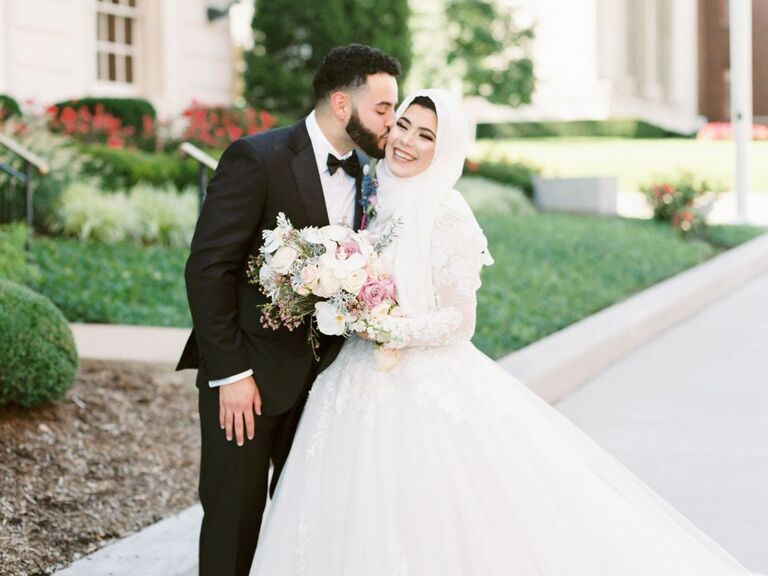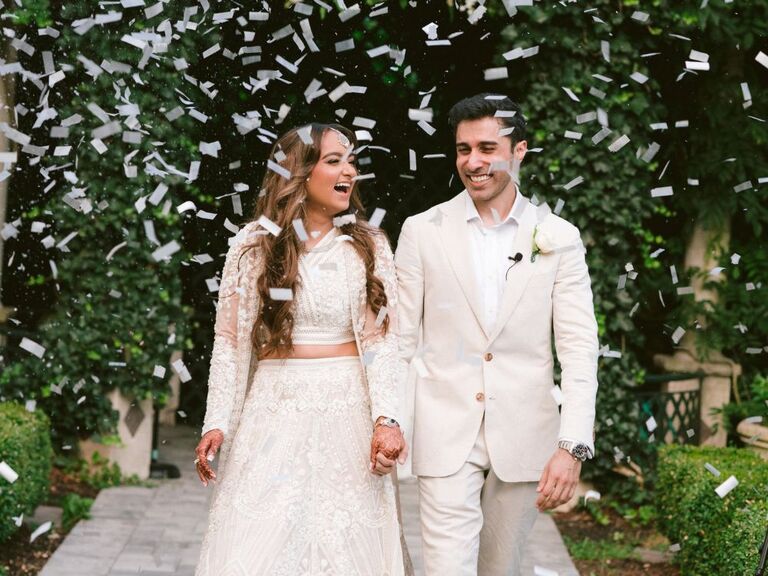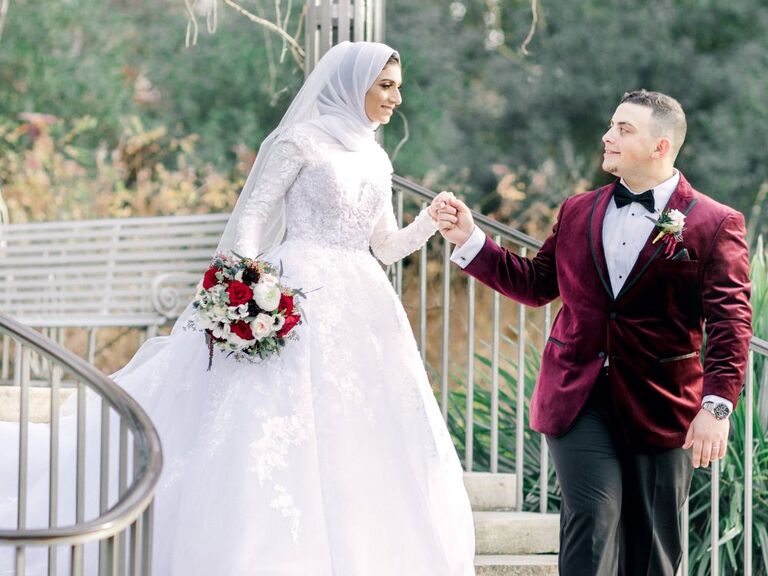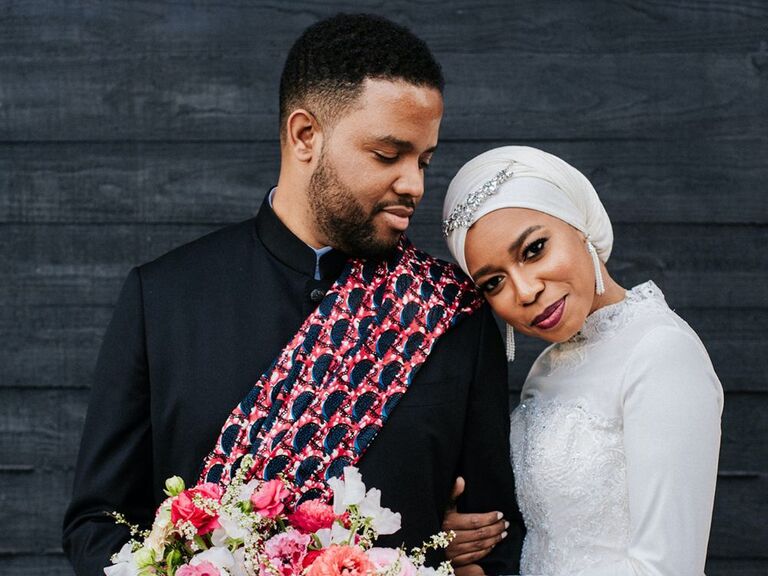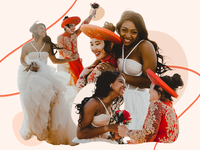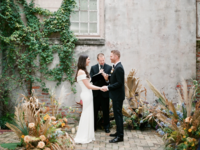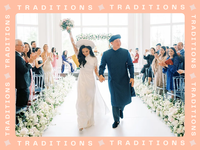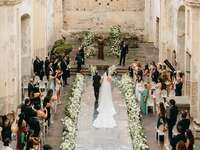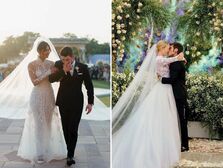The Muslim Wedding Traditions and Customs You Should Know
While weddings are about a couple coming together in matrimony, they're also about the blending of two families and are a great time to honor a religion, culture or heritage that holds deep meaning to you and your family. Given that Islam is the world's second-largest religion, it's no surprise that weddings celebrated in the Islamic faith are filled with beautiful heritage and wedding rituals passed down from generations. Whether you're attending a Muslim wedding for the first time or are in throes of wedding planning for your own traditional Muslim wedding ceremony and reception, understanding the intricacies of Muslim weddings is a must. We're taking a look at what happens at Muslim weddings—from the traditions and customs you should know to the regional differences of Muslim weddings across the globe.
We connected with wedding experts Sarah Khan, the wedding planner at the helm of Sarah Khan Event Styling, and John Campbell, the wedding planner behind John Campbell Weddings, to better understand the traditions and nuances of Muslim weddings. From frequently asked questions to specific traditions to expect, below you'll find an in-depth guide to traditional Muslim wedding ceremonies and receptions.
In this story:
- Frequently Asked Questions About Muslim Weddings
- South Asian Muslim Wedding Traditions
- Arab Muslim Wedding Traditions
- Muslim Wedding Traditions in the United States
Frequently Asked Questions About Muslim Weddings
If you're gearing up to attend a Muslim wedding for the first time, understanding the traditions the couple is including is one of the best ways to honor the newlyweds and ensure you're able to participate fully and respectfully in the celebration. Ahead of the big day, keep these Muslim wedding FAQs in mind.
How do Muslim weddings differ around the world?
"As the second-largest religion on the planet, with significant and diverse populations all over the globe, it's worth noting that there are countless ways Muslims celebrate and perform weddings," emphasizes Campbell. Khan concurs adding that "Muslim weddings differ based on regionality, this goes back to cultural and ethnic norms during a wedding. There may be some cultural and traditional nuances that take place, games or things that happen, whether it's South Asian, East Asian, North African, Arab, it all depends on the region. Some people take things from what their culture is, even if it doesn't have anything to do with Islam because it is just a way to celebrate the wedding and that's what makes it really beautiful that even though it is a Muslim wedding you can see it done so many different ways."
Specifically, Campbell shares that "one big difference is the way brides and grooms are presented to their spouse. In Arab weddings, it's usually a bride who is processed and presented to her groom during a zaffe. In South Asian weddings, it's normally a groom who is processed and presented to his bride during a baraat. Another marked difference is the number of celebrations. While an Arab wedding has one major reception-style celebration (the Walima), South Asian weddings traditionally have two: the Shaadi, which normally takes place the same day as the Nikah, and the Walima, which normally takes place the following day."
Beyond regionality, some differences can be seen even more granularly from country to country. Take Muslim weddings in Indonesia, for example. "While Indonesia is a Muslim-majority country (the largest in the world!), it doesn't recognize a national religion," says Campbell. "A Muslim marriage contract is still recognized as both a religious and civil document, but the Nikah ceremony must be overseen by both a religious officiant and a government official. Beyond that, the enormous number of ethnic groups and their unique cultures found throughout the islands of Indonesia means that the nation is home to an array of Muslim practices and traditions. A great example is a Javanese wedding tradition where the father of a bride will weigh the bride and groom each on his knees and claim they weigh the same in order to symbolize their equality."
What happens at a Muslim wedding?
"Most Muslim weddings will, at the very least, include a Nikah/katb Al kitab (the signing of a marriage contract), a presentation of a Mahr (a gift, usually of monetary value, that the groom gives to the bride), and a Walima/Valima (reception)," explains Campbell. "Depending on the personal preferences of a couple and their future plans, a Nikah can be the same day as a Walima, or even months before. Some Muslims will equate the time between a Nikah and Walima to the Western concept of dating, since it religiously allows both the bride and groom to be alone together without a chaperone; however, dating has become increasingly more common with Muslims who live in Western countries."
Is alcohol served at Muslim weddings?
No, when attending a Muslim wedding, "you can also expect a halal menu, including the absence of alcohol," says Campbell.
What should you wear to a Muslim wedding?
Generally speaking, modest attire is recommended. Longer pants and skirts are recommended and people of any gender should avoid having bare arms. If the wedding venue for the ceremony is a mosque, be prepared to remove your shoes before entering the sacred part of the mosque.
Muslim women at an Indian wedding may don a saree/ sari or lehenga, while brides at Arab weddings may wear long-sleeve wedding dresses with a hijab. Female wedding guests may be expected to cover their heads, so bringing a scarf is advised.
Are gifts appropriate at Muslim weddings?
Yes, gifts are acceptable and appreciated at Muslim weddings. Cash, to be presented to the couples during the wedding reception, is a traditional gift for guests to consider.
Do men and women sit separately at Muslim weddings?
"Any event that's part of a Muslim wedding, including a Walima, may involve the separation of the sexes by table or even into different rooms (something to keep in mind if you're a guest at a Muslim wedding)," advises Campbell. "This depends on the cultural background of the families and their personal religious views."
Kahn adds that for the layout of a Muslim wedding, "sometimes it will be gender-segregated where the men are seated on one side and the women are seated on another side. Some Muslim weddings are done where it is completely gender-segregated, where the groom and all the men are in a completely different room from the bride and all the women. After the ceremony is done respectively in two different rooms, the bride and groom then come together in one place or the groom will traditionally go to where the bride and all the women are and be seated with the bride. In other cases, everything happens in one place with no gender segregation and it all happens within the same hall, ballroom, venue or space. It really depends on the family overall."
South Asian Muslim Wedding Traditions
Whether it is Indian, Bangladeshi, Sri Lankan or Pakistani, a Muslim wedding in South Asia is sure to be a beautiful and celebratory affair. "South Asian weddings are always known and loved for their multiple-day events," says Campbell. He goes on to share that "a tradition popular in Bangladesh and parts of India is the Gaye Holud. At this prewedding event, both the bride and groom have turmeric spread on their skin and sing, dance, and celebrate their upcoming wedding with their family. A similar tradition is also practiced in Pakistan."
Mehndi
A menhdi is a prewedding event where the bride and other wedding guests, typically female family members and bridesmaids, will get henna designs done on their hands. Some South Asian couples may also have a Manjha, which is the equivalent of a Haldi, where the couple rubs turmeric paste on themselves ahead of the wedding.
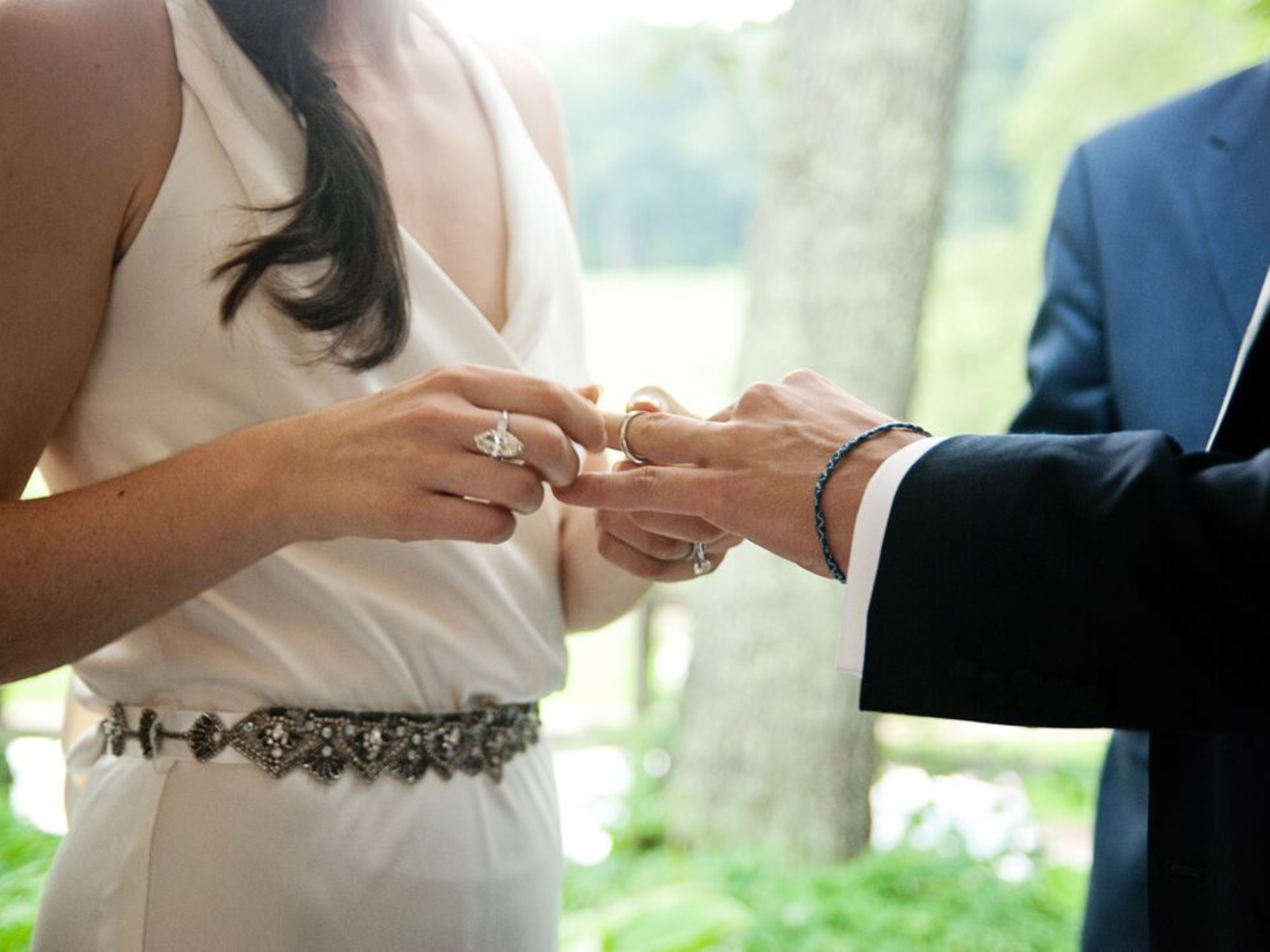


Nikah
"The nikah (or katb Al kitab) is, in short, a Muslim marriage ceremony," says Campbell. "The basis of this ceremony is the signing of the Muslim marriage contract. In Muslim-majority countries, this contract will act as both a religious and civil agreement (meaning this is what the government will use to legally recognize the marriage). The nikah ceremony is usually held in a mosque; however, in the US, especially in rural areas or places that don't have significant Muslim communities, a Nikah is often a very intimate family affair held at home. A nikah can be overseen by an Imam, a Qazi (Islamic judge), or any Muslim who has a deep understanding of Islamic traditions," such as a Maulvi.
Mahr
Khan goes on to explain that "going completely by the book for an Islamic wedding, the Nikah is required and a Mehr, and witnesses to the marriage. But based on regionality and the ethnicity of the couple, there will be cultural aspects that will play part in it. From a religious perspective for a Muslim wedding, it's the actual ceremony itself that matters which is about 10-15 minutes. For South Asian weddings, however, it is many days and very extended because a lot of the pieces of a wedding for a couple from a South Asian background are influenced by the culture of the region where they are from, whether it's Pakistan or India. So across different religions, there are a lot of different wedding events that are shared by different religious groups because they are more culturally part of a wedding."
Surah Al-Fatihah
This is the reading of the first chapter of the Quran which generally marks the beginning of an Islamic couple's engagement.
Arsi Mushaf
Arsi means mirror and Mushaf mean the Holy Quran—this is the part of the wedding where the groom sees the face of this bride in a mirror that is held between them.
Baraat
The wedding baraat is the groom's entrance to the Shaadi that takes place amid much fanfare. Often the groom will enter on a white horse while surrounded by drummers and wedding guests.
Shaadi
The Shaadi is the wedding celebration or wedding reception. This will often take place on the same day as the Nikah (wedding ceremony).
Joota Chupai
This translates to "hiding of the shoes" and is a fun custom wherein wedding party members and the bride's family members will playfully steal the groom's shoes and hold them for ransom as a practical joke.
Walima
The Walima, or Walimah, is another wedding reception, similar to the Shaadi. However, the main difference is that the Shaadi is generally hosted by the bride's family and the Walima is hosted by the groom's family and may take place at a later date.
Rukhsati
The Rukhsati, or Rukhsat, is the couple's grand exit from the wedding to their new home as newlyweds.
Arab Muslim Wedding Traditions
"Arab weddings are known for their elaborate productions, but their unique cultural elements are equally beautiful," says Campbell. Khan goes on to share that "with Arab Muslim weddings, the culture and tradition is much different. You also tend to see a color palette that is more neutral, with whites and golds. Typically the ceremony and reception is one day and both events are on the same day. When it comes to South Asian weddings, you're going to see multiple events starting out from months prior to the wedding; A lot of that is cultural where they'll have prewedding events starting from several months out being hosted for the couple. There are a lot of pre-wedding events before the ceremony and reception."
Tolbe
The Tolbe is a prewedding ceremony wherein the groom formally asks for the bride's hand in marriage. At this time a short prayer to Allah from the Holy Quran called the "Surah al-Fatiha" is read.
Katb Al-kitaab
The Katb Al-kitaab is also known as the Nikah and is the couple's wedding ceremony.
Mahr
The Mahr is a critical part of Muslim weddings—it is a gift that the groom gives to the bride.
Zaffe
"One of my favorite parts of an Arab wedding day is the zaffe (the entrance of the newlyweds into their reception)," says Campbell. "Using the word 'entrance' is a bit misleading, as this grand tradition includes drummers, dancing, and a chorus of guests doing the zaghrouta."
Walima
Khan shares that "sometimes at Pakistani Muslim weddings, you'll see events even after the reception. The bride's family will do a wedding—the ceremony and the wedding reception. Then the groom's family holds a reception called a Valima or Walima. Islamically, this is a requirement only for once the ceremony takes place that a dinner reception of some kind or a welcoming meal is held by the groom as an announcement of the marriage and as a welcoming to the bride and her family. Religiously, it is required that the man holds or pays for the reception. So this is actually a difference between South Asian weddings and Arab weddings. With Arab weddings, they do it more traditionally from an Islamic perspective where the groom pays for everything related to the wedding. Whereas in South Asian culture, the bride's family predominately pays for everything related to the wedding except for the Valima. So there ends up being two receptions; the bride's family holds one the day of the wedding and then the groom holds a completely separate dinner, which is the Islamic part of it."
Dabke
Dabke are the folk performances that happen at an Arab Muslim wedding. Couples will hire professional dances to get the dancing going.
Barmet Al-aroos
This is the couple's grand exit at the end of the wedding. Often wedding guests will follow the newlyweds in their own cars, honking and yelling in celebration as everyone heads back to the hotel.
Muslim Wedding Traditions in the United States
"During the African Diaspora, tens of thousands of African Muslims were brought to the US where, even though they were enslaved, they continued to practice their faith. Islam also started to gain popularity among Black Americans during the Civil Rights Movement," explains Campbell. "Now, approximately 15% of all US Muslims belong to (or are descended from) these groups. If you are going to a Black American Muslim wedding and the family belongs to the Salafi sect of Islam, you can expect men and women to be at separate tables, and an absence of any music or dancing—but still plenty of food!"
"There are probably more traditional events that you're more easily able to accommodate abroad in someone's home country than here in the US. This is just because certain things aren't available but generally, people do the best they can to replicate those things and the beauty of it is a lot of people that were born and raised in the US will incorporate things from American culture," notes Khan. "Some examples are bridal party flowers, bridesmaids and bridesmaids bouquets. These aren't things that are part of Muslim culture but being born and raised in the US, those are some things people end up incorporating. So we've kind of made a different Muslim wedding identity, culture and tradition here in the US with looking to our elders for traditional elements of a wedding from back home and blending the two together here.
I've never actually attended a wedding back home. I believe the last time I attended one I was 5 so I can't really speak too much of what is missing but I definitely can say I'm sure there are certain events or cultural things that we don't do here in the States just because it's not as easy to do here and takes much more effort, and resources aren't as available."
